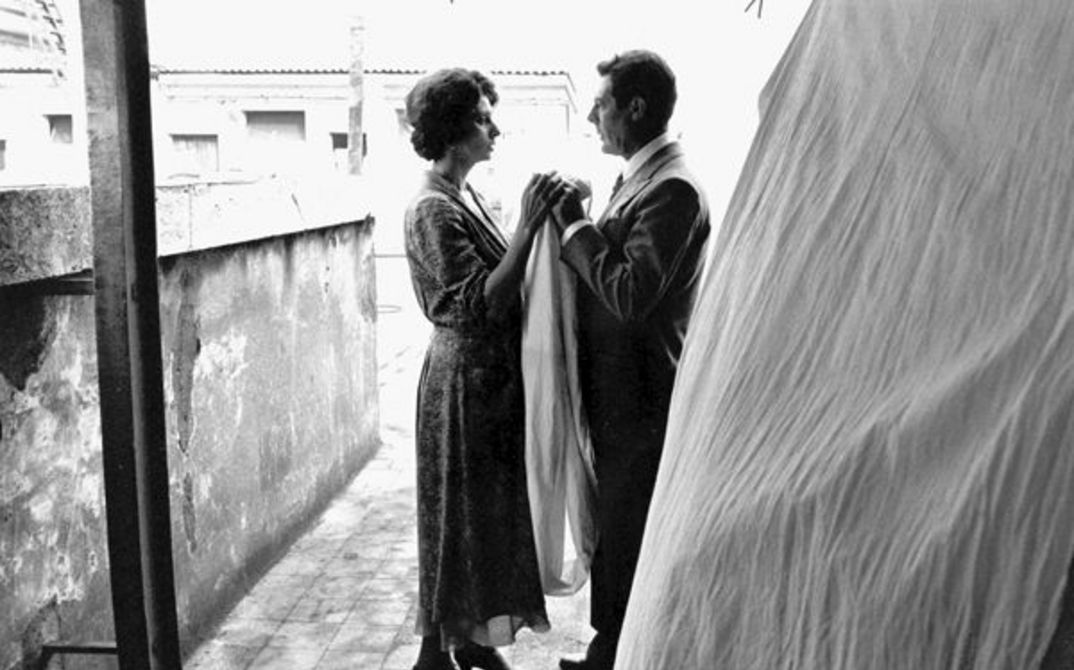ORLY (Angela Schanelec, G/F 2010, 1. & 5.4.) Paris' Orly Airport provides the setting for loosely-linked scenes. Four pairs of people waiting for their flights are observed. A man and a woman who get to know each other; a mother and her almost adult son; a young couple traveling together and a woman who has just left a man. Intimate dialogues unfold in a (semi) public space, one of transit, of waiting. Encounters, farewells and separations take place in a real space.
THE SHINING (Stanley Kubrick, GB/USA 1980, 2. & 7.4.) An unsuccessful writer (Jack Nicholson) spends the winter with his wife and small son in an empty hotel in the mountains, to work on his novel in peace. Not only the family gets lost in the huge hotel with its endlessly appearing corridors. Spaces, times and people merge and make any kind of orientation impossible in THE SHINING; the house develops a disquieting life of its own.
A LONDONI FÉRFI(The Man from London, Béla Tarr, Hungary/F/G 2007, 3. & 12.4.) Using hypnotically long tracking shots (Camera: Fred Kelemen) Tarr's noir-esque adaptation of Simenon plumbs the perception capacities of a switchman on a night shift who observes a murder from his elevated control room that overlooks the whole bay. With boundary expanding blacks, a dark pessimistic interior view of moribund life, an existential contemplation about guilt, complicity and forgiveness.
ALL THAT HEAVEN ALLOWS (Douglas Sirk, USA 1955, 8. & 14.4.) The widow Carrie (Jane Wyman) lives just as her adolescent children and the rigid social order of her small town expect. With the slightly younger gardener Ron (Rock Hudson), she gets to know a world free of social constraints. An attack on bourgeois conventions in the guise of a highly-polished melodrama, in which social spaces are clearly defined. Before the screening we will show DIE URSZENE (Christine Noll Brinckmann, FRG 1981) An insight into different bedrooms, to the sound of hits from the 1950s.
SCHLOSS VOGELÖD (F.W. Murnau, D 1921, 15. & 19.4., on piano: Eunice Martins) "A long, narrow, high-ceilinged room. The light pierces downward from two tall windows; two shadowy figures face each other, leaning against opposite walls, withdrawn into the dark." (Lotte Eisner) Poor weather conditions compel a hunting party to sitting inside in a castle's baroque and foreboding spaces. The arrival of an uninvited guest - a count reputed to have killed his own brother - leads to the revelation of a secret.
VERTIGO (Alfred Hitchcock, USA 1958, 16. & 22.4.) A film of spiral shapes, of attacks of vertigo, hairpin turns, stairwells and vertigo in which time levels and eventually spaces seem to dissolve. Dizziness overcomes the private detective Scottie (James Stewart) who has been scared of heights since a failed manhunt over the roofs of a big city. Commissioned to shadow the wife or a former colleague, he gets sucked into a whirlpool of love, obsession, deceit and phantasm.
EL ÁNGEL EXTERMINADOR (The Exterminating Angel, Luis Buñuel, Mexico 1962, 17. & 20.4.) A glamorous party takes place in a bourgeois villa. When the guests get ready to leave, they are held back from crossing the threshold by what seems to be an invisible band. The room in which the elegant party took place has turned into a prison and undergoes a change: The luxurious ambience is replaced by disorder, chaos, dirt, and anarchy.
PERRET IN FRANKREICH UND ALGERIEN (Heinz Emigholz, G 2012, 18. & 21. 4.) Rainer Gansera describes this encounter between 30 constructions and ensembles made by the French architects and engineers Auguste and Gustave Perret as a "drama of reconstruction". At the same time as their work on several building projects in France, the Perrets were also working in colonial North Africa. The film depicts this dichotomy chronologically.
GERTRUD (Carl Theodor Dreyer, DK 1964, 24. & 28.4.) With long, observant takes, Dreyer frames both the spaces and the people within them and fixes their relationships. In reduced, slow and deliberate fashion, the Danish director captures Danish bourgeoisie at the turn of the century. Center stage is Gertrud who, in search for unconditional love, leaves her husband and breaks off from her childhood friend and also eventually her lover. A story of emancipation and loneliness.
DISTANT VOICES, STILL LIVES (Terence Davies, GB 1988, 25. & 26.4.) A crowded terraced house, the daily life of a working-class family in Liverpool between 1940 and 1960: the tyrannical father, the resigned mother, two daughters, a son, an atmosphere of fear characterized by violence, helplessness and speechlessness. With strict geometric takes, still lifes, the camera measures up the rooms and is often still while the action takes place in the next-door room: a silent observation of empty spaces seeking traces of life.
UNA GIORNATA PARTICOLARE (A Special Day, Ettore Scola, I 1977, 29. & 30.4.) May 1938: In an abandoned tenement home - the whole of Rome is taking part in Mussolini's parade to celebrate Hitler's visit - a rather naive housewife and a radio reporter recently fired on grounds of homosexuality encounter each other. In roles that are completely at odds with their usual images, Sophia Loren and Marcello Mastroianni seek out a short moment of freedom and hope that contradicts the noisescape of the military parade. (mg/al)
